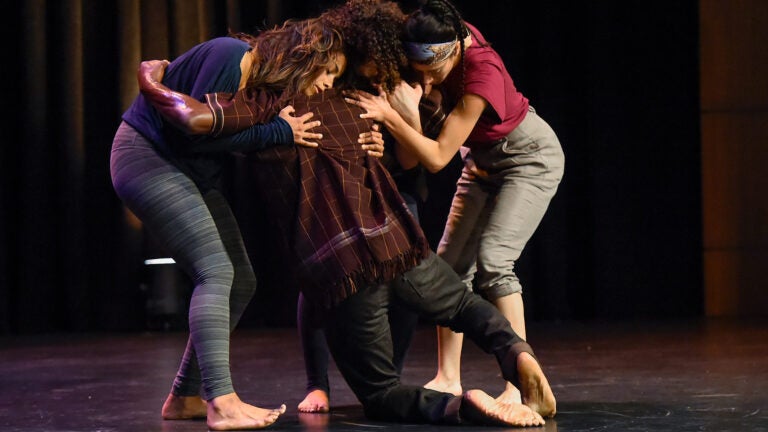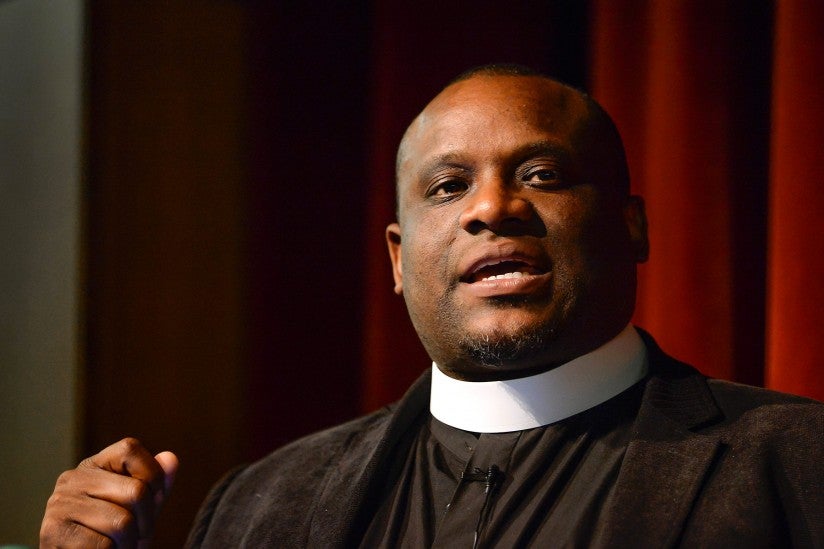
Culture is key to turning the page on hostilities
That’s the consensus among panelists at a timely USC conference on civil discourse
The lights dimmed in the Ronald Tutor Hall Ballroom on Wednesday as the Los Angeles-based CONTRA-TIEMPO took the stage at “Turning the Page on Hate: Building Community for a More Civil Society.” Haunting music, stomping feet and desperate calls for justice from a dance troupe may seem like a strange opening for a conference on civil discourse, but culture, as the panelists would argue, is the key to turning the page on hate.
In his first event as holder of the Turpanjian Chair in Civil Society and Social Change, Manuel Pastor of the USC Dornsife College of Letters, Arts and Sciences brought organizers and leaders together to discuss why civility is lost in a sea of language fueled by hostility.
“We’re here today to create a different language,” said Pastor, professor of sociology and American studies and ethnicity, to the audience of students, academics and community members following the dance performance. “A language of bridge building.”
Pastor’s call for a change in civil discourse was echoed by USC Provost Michael Quick.
I need to know how the university can be partners in this endeavor.
Michael Quick
“I need to know how the university can be partners in this endeavor,” Quick said. “Each year I graduate an army, and I want them fully immersed in civil discourse and know how to move social change.”
‘Few are guilty, all are responsible’
The program included a keynote address by the Rev. Michael McBride, director of Urban Strategies/Live Free Campaign with the PICO National Network, which fueled the panel discussion. McBride, a fourth-generation Pentecostal preacher, pointed to an overarching theme driving hate-filled discourse in the political realm, as well as one that has permeated society: a love deficit and a hate surplus.

As each panelist responded to McBride’s call that “few are guilty, but all are responsible,” a distinction was made between anger and hate, and transformation and reconciliation.
The panel, which included Gail Christopher, vice president and senior advisor of the W.K. Kellogg Foundation; Burt Lauderdale, executive director of Kentuckians for the Commonwealth; Najeeba Syeed, assistant professor at the Claremont School of Theology and director of the Center for Global Peacemaking; and Eric Nazarian, alumnus of the USC School of Cinematic Arts and fellow at USC Dornsife’s Institute of Armenian Studies, all agreed that turning the page on hate cannot be done in a vacuum of academia or through a single conversation. Rather, as Syeed and Nazarian agreed, there is an empathy gap that must be acknowledged in order to move forward.
“We cannot do anything for change without empathy,” Nazarian said.
Nazarian reasoned that empathy and understanding of the human condition must be a societal change, beginning with the nation’s children.
“Perhaps if schools taught the fragility of human life and math, our children would innately seek tolerance, which we desperately lack in society,” he said.
Following the panel discussion, Pastor charged all in the room with leading the way to turn the page on hate.
Rather than playing chess — a game focused on two distinct sides focused on the dominating each other — we must instead think of leading the way as solving a jigsaw puzzle — an exercise in which all involved must work collectively to fit individual pieces seamlessly to complete the tapestry, according to Pastor.
“We have been playing way too much chess in this country.”
